![Best wishes for Ramadan]()
Jun 9, 2016 | Non categorizzato
 “May glory be upon you my Lord, He who is the Adored One, the One to be adored, the Eternal One, who existed from all times, who loves us, whose Mercy and Power embrace the universe (…). You are the Adored One, Oh Lord, You are the Master who loves and forgives. Your forgiveness and Your mercy are infinite, Oh Lord, You help those who are afflicted, the Consoler in every grief, the Refuge for those whose heart is broken.” (From a prayer by Ali ibn Abi Talib, cousin and son-in-law of the Islamic prophet Muhammad)
“May glory be upon you my Lord, He who is the Adored One, the One to be adored, the Eternal One, who existed from all times, who loves us, whose Mercy and Power embrace the universe (…). You are the Adored One, Oh Lord, You are the Master who loves and forgives. Your forgiveness and Your mercy are infinite, Oh Lord, You help those who are afflicted, the Consoler in every grief, the Refuge for those whose heart is broken.” (From a prayer by Ali ibn Abi Talib, cousin and son-in-law of the Islamic prophet Muhammad)

Jun 8, 2016 | Non categorizzato
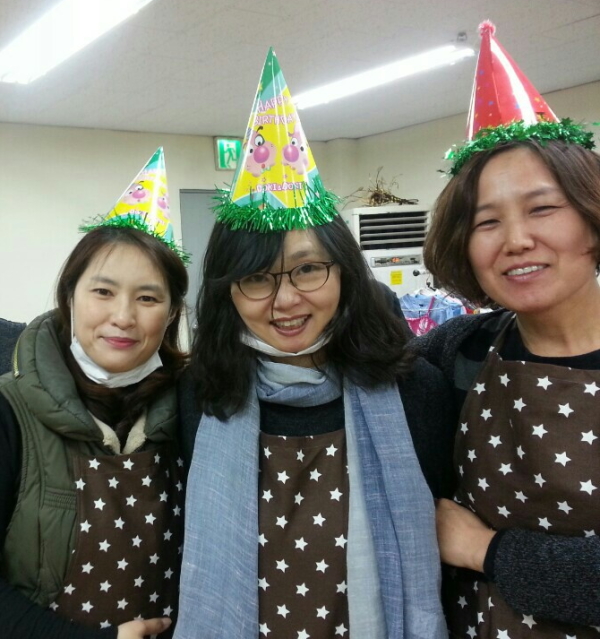 Seongnam, South Korea, more than a million inhabitants on the southeastern outskirts of Seoul, is a growing city with the presence of large companies that further the economic development of the area in a city where there is great wealth alongside abject poverty. “In Korea there is a strong immigration of women from several Asian countries: China, Vietnam, Cambodia, Japan, and more. They come here to marry or to escape from misery. Hence, the many multi-cultural families, most of them living in the poor areas of our city,” explains a Focolare group from Korea who were attending the OnCity international conference in Castelgandolfo, Italy. One of their greatest needs is integration.
Seongnam, South Korea, more than a million inhabitants on the southeastern outskirts of Seoul, is a growing city with the presence of large companies that further the economic development of the area in a city where there is great wealth alongside abject poverty. “In Korea there is a strong immigration of women from several Asian countries: China, Vietnam, Cambodia, Japan, and more. They come here to marry or to escape from misery. Hence, the many multi-cultural families, most of them living in the poor areas of our city,” explains a Focolare group from Korea who were attending the OnCity international conference in Castelgandolfo, Italy. One of their greatest needs is integration. 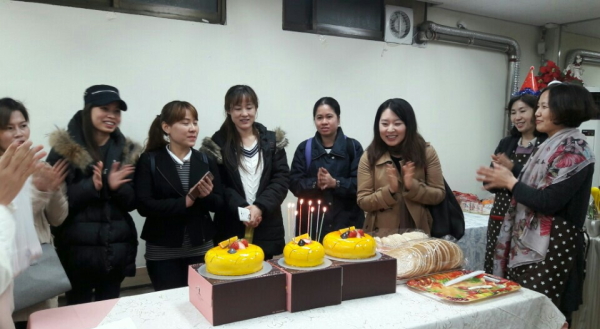 In the Multicultural Centre where some of the Focolare members work, they teach women immigrants to speak Korean, and have proposed establishing some kind of child care programme to entertain the children while their mothers learn the new language. “But at one point the government funding was removed and we couldn’t continue with our activity,” they say. “We told some friends who share our commitment in living ideals of unity and peace in our city. Each one of them gave what they could: time, skills – taking on the problems and situations of many people.” They were faced with truly painful situations: settling in a new country is not easy. For many, the Centre was a place where they could catch their breath, a place where they could share one another’s problems, especially financial problems.
In the Multicultural Centre where some of the Focolare members work, they teach women immigrants to speak Korean, and have proposed establishing some kind of child care programme to entertain the children while their mothers learn the new language. “But at one point the government funding was removed and we couldn’t continue with our activity,” they say. “We told some friends who share our commitment in living ideals of unity and peace in our city. Each one of them gave what they could: time, skills – taking on the problems and situations of many people.” They were faced with truly painful situations: settling in a new country is not easy. For many, the Centre was a place where they could catch their breath, a place where they could share one another’s problems, especially financial problems.  In 2012 we opened a small market where you could buy what you needed at a low cost. We called this small temporary project: The Mary of Nazareth Project. Many people helped us by donating clothing, toys, office supplies and linens.” What could be done with the small sum of around 353 Euros? “We decided to follow the Economy of Communion approach of distributing the profits: 1/3 for a family (a Cambodian family that our community had taken into its care until they could stand on their own); 1/3 to buy any additional things they might need; 1/3 for everyone in the group (to celebrate the birthdays of immigrants who didn’t have families with them). Finally, the Maria Market recived a donation from the government and the Centre decided to remodel the shop. But it was only reopened in 2014 after much expectation. The following year, they received a visit from the Mayor. In June 2015, with the spread of Mers in Korea, 2,900 schools were closed and 4,000 people were placed in isolation. Like many public locations the Centre also had to close. However, during the period of the shut-down, “we visited people in their homes and supported them in the little things. In the end, the Centre gave us a “Thank You” plaque. Now Maria Market is open again and always developing new ideas like mail delivery service for long distance customers. For the group running the project it continues to be “a concrete experience of answering the needs of our neediest sisters and brothers.”
In 2012 we opened a small market where you could buy what you needed at a low cost. We called this small temporary project: The Mary of Nazareth Project. Many people helped us by donating clothing, toys, office supplies and linens.” What could be done with the small sum of around 353 Euros? “We decided to follow the Economy of Communion approach of distributing the profits: 1/3 for a family (a Cambodian family that our community had taken into its care until they could stand on their own); 1/3 to buy any additional things they might need; 1/3 for everyone in the group (to celebrate the birthdays of immigrants who didn’t have families with them). Finally, the Maria Market recived a donation from the government and the Centre decided to remodel the shop. But it was only reopened in 2014 after much expectation. The following year, they received a visit from the Mayor. In June 2015, with the spread of Mers in Korea, 2,900 schools were closed and 4,000 people were placed in isolation. Like many public locations the Centre also had to close. However, during the period of the shut-down, “we visited people in their homes and supported them in the little things. In the end, the Centre gave us a “Thank You” plaque. Now Maria Market is open again and always developing new ideas like mail delivery service for long distance customers. For the group running the project it continues to be “a concrete experience of answering the needs of our neediest sisters and brothers.”
![Best wishes for Ramadan]()
Jun 7, 2016 | Non categorizzato
 The news summary will be made available on the Collegamento CH website a few days before the Internet transmission. On the same website one can find all the previous linkups in various languages, as full editions as well as individual news video clips. https://vimeo.com/170950751
The news summary will be made available on the Collegamento CH website a few days before the Internet transmission. On the same website one can find all the previous linkups in various languages, as full editions as well as individual news video clips. https://vimeo.com/170950751
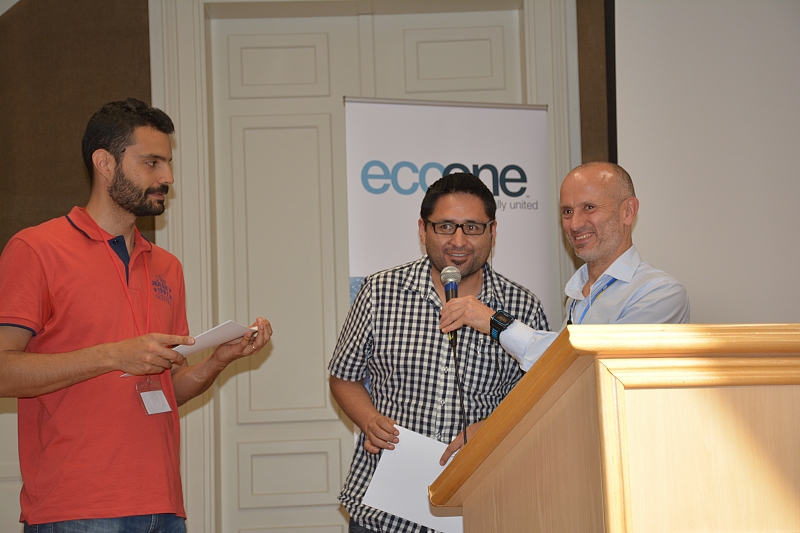
Jun 6, 2016 | Non categorizzato
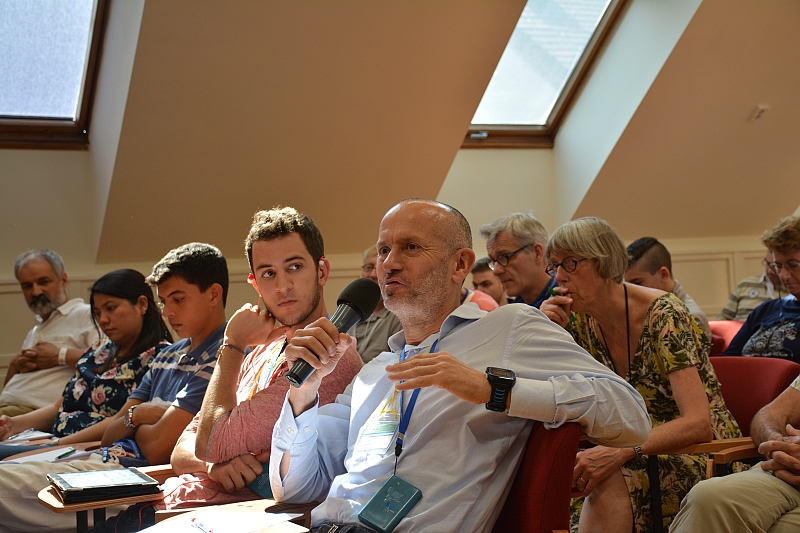 The international coordinator of EcoOne called it “a successful experiment that has addressed a word of hope: A human being who is open to being a gift could in fact be the answer to the epochal environmental challenges that humankind finds itself facing. The meeting was held in Budapest, Hungary from May 27 until May 29 at the Pázmány Péter Catholic University and was attended by 80 representatives of environmental NGOs, university faculty, civil servants, professionals in the field of environment, and high school and university students from different countries. High-level scientific presentations were accompanied by practical experiences and transdisciplinary reflection on fields such as economics and political ethics. There were several presentations: from a 15 year-old boy to an elderly man who is dedicated to caring for the environment in the Focolare town in Holland. Three Italian students presented their experience that straddled energy-saving and the culture of giving. Erasmus, a student in Budapest, a student from Rome and a Brazilian also presented their experiences. The young man from Brazil paid for the trip by making and selling knick-knacks, and receiving a contribution from his university that made an exception in his case.
The international coordinator of EcoOne called it “a successful experiment that has addressed a word of hope: A human being who is open to being a gift could in fact be the answer to the epochal environmental challenges that humankind finds itself facing. The meeting was held in Budapest, Hungary from May 27 until May 29 at the Pázmány Péter Catholic University and was attended by 80 representatives of environmental NGOs, university faculty, civil servants, professionals in the field of environment, and high school and university students from different countries. High-level scientific presentations were accompanied by practical experiences and transdisciplinary reflection on fields such as economics and political ethics. There were several presentations: from a 15 year-old boy to an elderly man who is dedicated to caring for the environment in the Focolare town in Holland. Three Italian students presented their experience that straddled energy-saving and the culture of giving. Erasmus, a student in Budapest, a student from Rome and a Brazilian also presented their experiences. The young man from Brazil paid for the trip by making and selling knick-knacks, and receiving a contribution from his university that made an exception in his case.  Five young researchers received the Piero Pasolini Prize for the quality of their presentations, thanks to the financial support of the Economy of Communion. “Several agencies of the Focolare Movement were involved in the preparation of the event: Action for a United World, Economy of Communion, New Humanity Movement, New Humanity, Young for Unity, Movement Politics & Policy for Unity., Sophia University Institute and an excellent logistical team from the Hungarian EcoOne Group,” Fiorani affirmed. Zsusa Román, the coordinator of EcoOne in Hungary opened the event with a question: “What kind of person does it take to care for the environment?” Fiorani went on to present the features and objectives of EcoOne as: “a cultural initiative at an international level, promoted by experts, researchers and professionals that work in the environmental science sector. We share a common desire to enrich our scientific knowledge with a humanistic approach to ecological and naturalistic problems. With our partners who join us in pursuing a global sharing of the world’s goods and a close interdependence among countries, EcoOne attempts to make such principles flow into society, politics and economy inasmuch as they are also related to the topic of the environment.” Auxiliary Bishop of Esztergom, Hungary, János Székely cited the importance of “sobriety and of the gift” in line with Pope Francis’s Laudato si. A lively debate followed the presentation by Professor Miguel Panão, which focused on a new anthropological notion of the human person as someone in the act of giving himself or herself to others and to nature. The roundtable was particularly appreciated in which the social challenges that are posed by the environment were discussed from a theological, climatological, economic and political point of view, underscoring how much the environmental problem requires the contribution of many disciplines, beginning with politics which guides decisions, and the economy that sets up the models of development. Fiorani concluded saying: “The meeting isn’t an arrival point, but a point of departure. Now we have to prepare for new challenges. The next meeting will be held in Asia!” Info: EcoOne
Five young researchers received the Piero Pasolini Prize for the quality of their presentations, thanks to the financial support of the Economy of Communion. “Several agencies of the Focolare Movement were involved in the preparation of the event: Action for a United World, Economy of Communion, New Humanity Movement, New Humanity, Young for Unity, Movement Politics & Policy for Unity., Sophia University Institute and an excellent logistical team from the Hungarian EcoOne Group,” Fiorani affirmed. Zsusa Román, the coordinator of EcoOne in Hungary opened the event with a question: “What kind of person does it take to care for the environment?” Fiorani went on to present the features and objectives of EcoOne as: “a cultural initiative at an international level, promoted by experts, researchers and professionals that work in the environmental science sector. We share a common desire to enrich our scientific knowledge with a humanistic approach to ecological and naturalistic problems. With our partners who join us in pursuing a global sharing of the world’s goods and a close interdependence among countries, EcoOne attempts to make such principles flow into society, politics and economy inasmuch as they are also related to the topic of the environment.” Auxiliary Bishop of Esztergom, Hungary, János Székely cited the importance of “sobriety and of the gift” in line with Pope Francis’s Laudato si. A lively debate followed the presentation by Professor Miguel Panão, which focused on a new anthropological notion of the human person as someone in the act of giving himself or herself to others and to nature. The roundtable was particularly appreciated in which the social challenges that are posed by the environment were discussed from a theological, climatological, economic and political point of view, underscoring how much the environmental problem requires the contribution of many disciplines, beginning with politics which guides decisions, and the economy that sets up the models of development. Fiorani concluded saying: “The meeting isn’t an arrival point, but a point of departure. Now we have to prepare for new challenges. The next meeting will be held in Asia!” Info: EcoOne
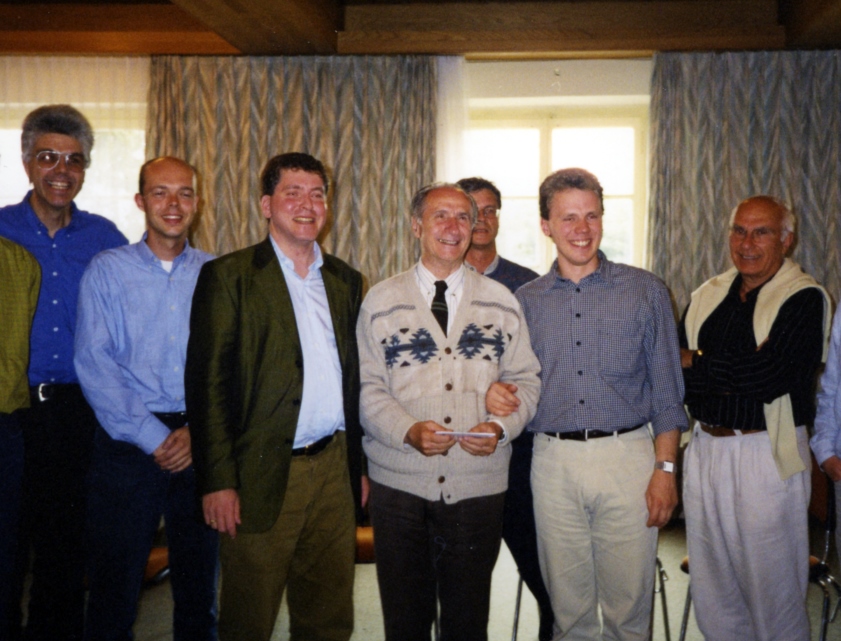
Jun 5, 2016 | Non categorizzato
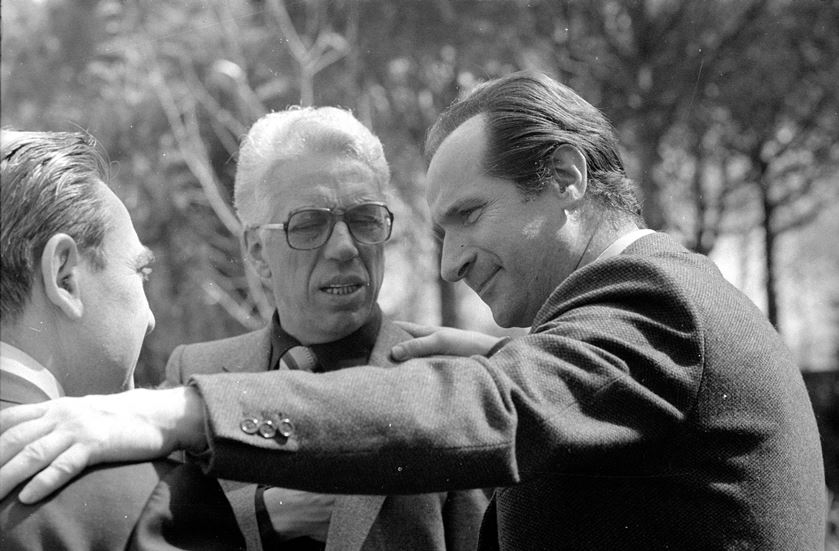
Giorgio Marchetti (right) with Gino Bonadimani and Aldo Stedile. Photo © CSC Audiovisivi
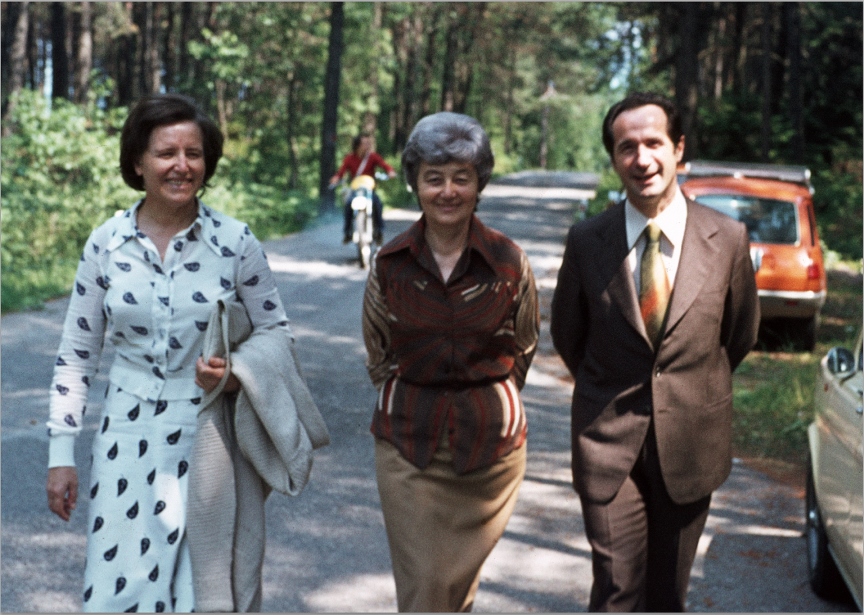
(from left) Valeria Ronchetti, Chiara Lubich and Giorgio Marchetti. Photo © CSC Audiovisivi
 Former head of the Section of the Focolarini from 1957, he returned to that task in 2000, a task that he carried out with dedication. He gave special attention to the married focolarini and the particular nature of their vocation. While strongly dedicated to others, Fede – with his scholarly attitude – did never failed to delve into a variety of disciplines. From 1995 he was a member of the Abba School, the Movement’s Centre for Interdisciplinary Studies where he offered his expertise in the field of ethics, but also philosophy and psychology. In the final years, with his health problems, a period began that Fede loved to describe as “one of the most beautiful periods of my life, so much so that I often find myself saying to Jesus: ‘I never knew that old age could be a beautiful adventure like this!” It was characterized by an “ever deeper and more intimate relationship with Jesus.” When people asked him how he was feeling, he would answer: “physically bad, but spiritually beautiful!” Fede’s legacy is certainly his unbreakable faith in God and in the charism of unity. His legacy is certainly that of a wise and efficacious builder of a work of God – the Focolare Movement, which he helped to develop and to make visible and active in the Church and in the world.
Former head of the Section of the Focolarini from 1957, he returned to that task in 2000, a task that he carried out with dedication. He gave special attention to the married focolarini and the particular nature of their vocation. While strongly dedicated to others, Fede – with his scholarly attitude – did never failed to delve into a variety of disciplines. From 1995 he was a member of the Abba School, the Movement’s Centre for Interdisciplinary Studies where he offered his expertise in the field of ethics, but also philosophy and psychology. In the final years, with his health problems, a period began that Fede loved to describe as “one of the most beautiful periods of my life, so much so that I often find myself saying to Jesus: ‘I never knew that old age could be a beautiful adventure like this!” It was characterized by an “ever deeper and more intimate relationship with Jesus.” When people asked him how he was feeling, he would answer: “physically bad, but spiritually beautiful!” Fede’s legacy is certainly his unbreakable faith in God and in the charism of unity. His legacy is certainly that of a wise and efficacious builder of a work of God – the Focolare Movement, which he helped to develop and to make visible and active in the Church and in the world.
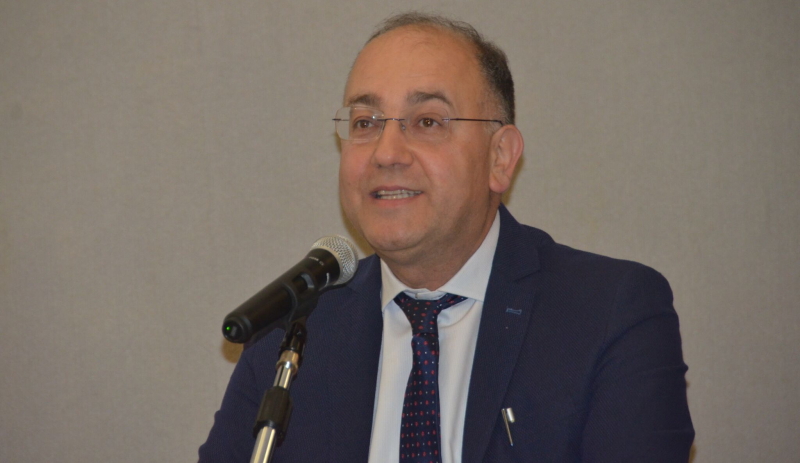
Jun 4, 2016 | Non categorizzato

Luigino Bruni
 “May glory be upon you my Lord, He who is the Adored One, the One to be adored, the Eternal One, who existed from all times, who loves us, whose Mercy and Power embrace the universe (…). You are the Adored One, Oh Lord, You are the Master who loves and forgives. Your forgiveness and Your mercy are infinite, Oh Lord, You help those who are afflicted, the Consoler in every grief, the Refuge for those whose heart is broken.” (From a prayer by Ali ibn Abi Talib, cousin and son-in-law of the Islamic prophet Muhammad)
“May glory be upon you my Lord, He who is the Adored One, the One to be adored, the Eternal One, who existed from all times, who loves us, whose Mercy and Power embrace the universe (…). You are the Adored One, Oh Lord, You are the Master who loves and forgives. Your forgiveness and Your mercy are infinite, Oh Lord, You help those who are afflicted, the Consoler in every grief, the Refuge for those whose heart is broken.” (From a prayer by Ali ibn Abi Talib, cousin and son-in-law of the Islamic prophet Muhammad)









